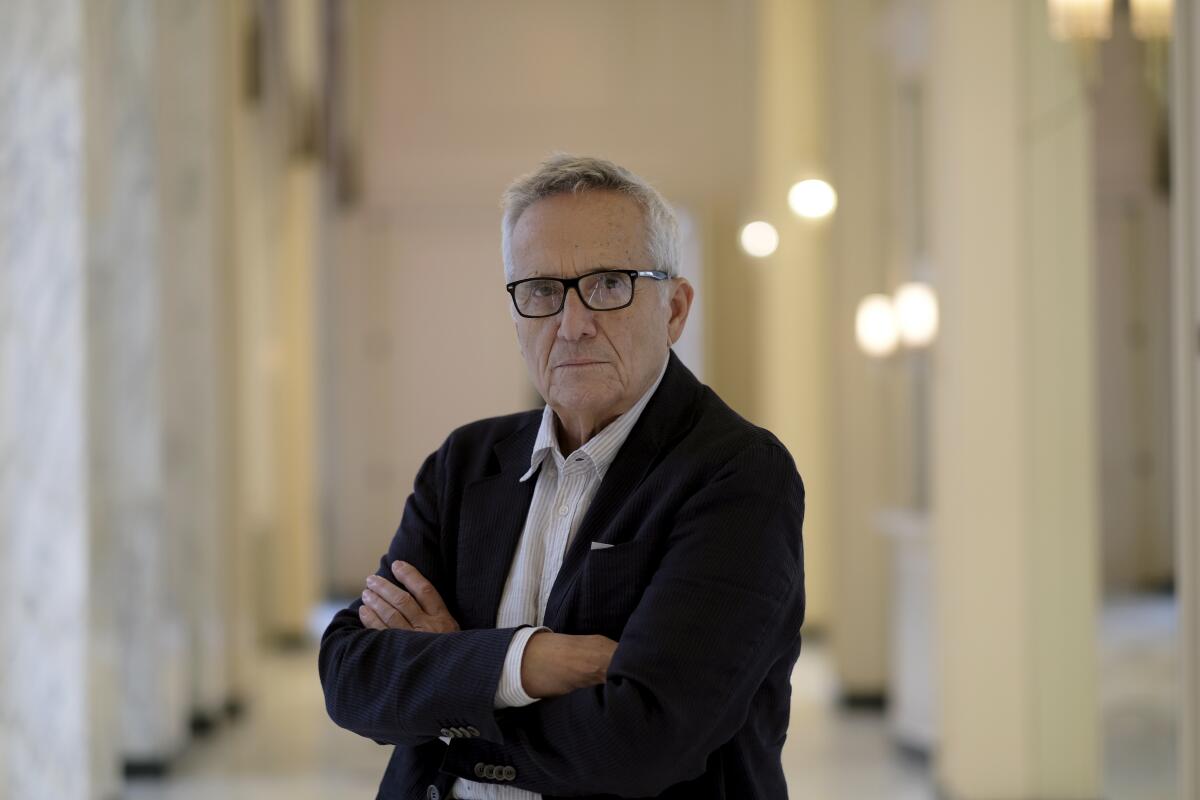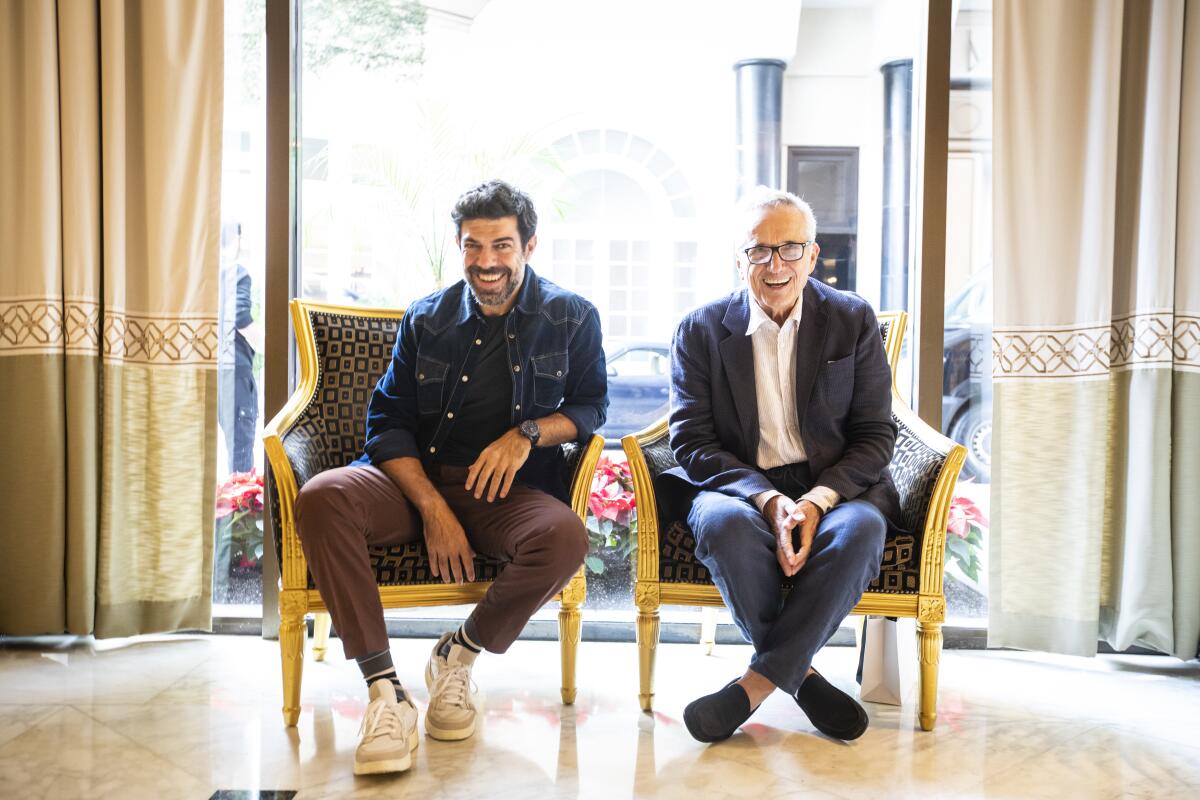The Mafia movie becomes grand opera in Marco Bellocchio’s epic ‘The Traitor’

- Share via
NEW YORK — Even before you can find a polite way of asking the question, Marco Bellocchio has an answer: “No!” He’s not slowing down. His English may be getting worse by the minute, but that’s only because he’s been on the road so much. Wearing the kind of Italian suit that would look good even if you slept in it — and maybe he has — the much-honored filmmaker smiles.
“We all have to die one day,” he says, an eyebrow cocked. “And I think this is a way of putting it off as long as possible.”
“This” is cinema, something the 80-year-old director — of such international hits as “Good Morning, Night,” “My Mother’s Smile” and “Vincere” (an Oscar nominee in 2010) — has been at since the ’60s (with his very dark debut domestic drama, “Fists in the Pocket”). Back then, he and his compadres, among them Pier Paolo Pasolini, were radicalizing Italian cinema. Since then, Bellocchio, born a Catholic and inclined to be a Marxist, has always created films as acts of incitement. Young man’s films, in other words.
“I think he’s one of the youngest directors we have,” said Pierfrancesco Favino, who plays the title character in Bellocchio’s latest provocation, “The Traitor.”
An epic by any measure, “The Traitor” tells the story of the so-called Maxi Trials of the Sicilian Mafia, through the life story of Tommaso Buscetta, one of the first Palermo mobsters to turn on the organization. It’s violent, outrageous and picaresque. It names names among collaborating Italian politicians. It paints Buscetta as the unreconstructed criminal he was. What it’s not is romantic.
“It was not in my intention to romanticize in any way,” Bellocchio said, during a visit here. “My points of reference were, on one hand, the history of the Mafia, based on the record, and, on other hand, a more secret part. I don’t know how successful I was, but I wanted to personalize it through my gaze and to personalize it by somehow imagining a biography of a life I myself had never lived.”
Beginning in 1980, “The Traitor” opens with a party that introduces characters and their relationships; there are betrayals, murders, inventive abuses — Buscetta’s wife (Maria Feranda Candido) is dangled out of a helicopter. There is an assassination in a bedroom that seems like an homage to the blood-soaked crescendo of “The Godfather.” It wouldn’t be the craziest thing to imagine that what Bellocchio wanted to make was a grand-opera version of the gangster movie.
“What references there are to some of the great American films about gangsters has probably been introjected in me. It’s a very psychoanalytic term,” he said. “But our life is made out of all the films we’ve seen, including ‘The Godfather’ and so in making this film, my imagination is fed by these things. My life has been fed by these things. And so, of course, they’re going to be reflected in the film.”
The relationships of Italian and American audiences to “The Traitor” are going to be different, mirroring their different perspectives on the real-life Mafia. (“There are moments during the court scenes that Italian people know by heart,” said Favino. “They’re practically Shakespearean.”) What Bellocchio didn’t set out to make, he said, was a film for American audiences.
“I’ve been showing the film around the United States and the interest is there,” he said. “But when I set out to make this film I set out to make an Italian story and for an Italian public. It was a big success in Italy and it’s a big success in France as well. But my borders, if I can even refer to them that way, are Italian.
“Having said that,” he adds, twinkling, “if it pleases American audiences, I will be quite happy.”

On that subject, he has a broad frame of reference regarding the fate of foreign films on the American market.
“There will always be a specialized public that loves foreign and arthouse films,” he said. “But the audience perception changes according to taste, fashion, whatever ideas are circulating. In the ’60s there were certain ideas, now there are others.
“But in terms of the presence of Italian film in American, it’s become more and more marginal. I can personally attest to having films released here with results that I call discreet. They were not big hits. And I don’t think they made a huge change in how Americans respond to foreign films.”
But you have to be who you are. “It’s naïve to think otherwise,” he said. “There’s a long history of Italian filmmakers who have tried to make films for the American public and it has rarely, if ever, worked. I think from me to get the best of myself I need to make films based on stories on know, situations I know.”
To which, of course, “there are some exceptions,” he said. “A film I adored a child that I saw in my hometown of Bobbio, was ‘Senso’ by Visconti. He had this very big budget so he shot the whole film originally in English. And this is true of another film by Visconti, ‘The Leopard,’ which again was shot with an international cast, speaking English and dubbed. For me, of course, the authentic version will always be the one with Burt Lancaster speaking Italian.”
More to Read
Only good movies
Get the Indie Focus newsletter, Mark Olsen's weekly guide to the world of cinema.
You may occasionally receive promotional content from the Los Angeles Times.










